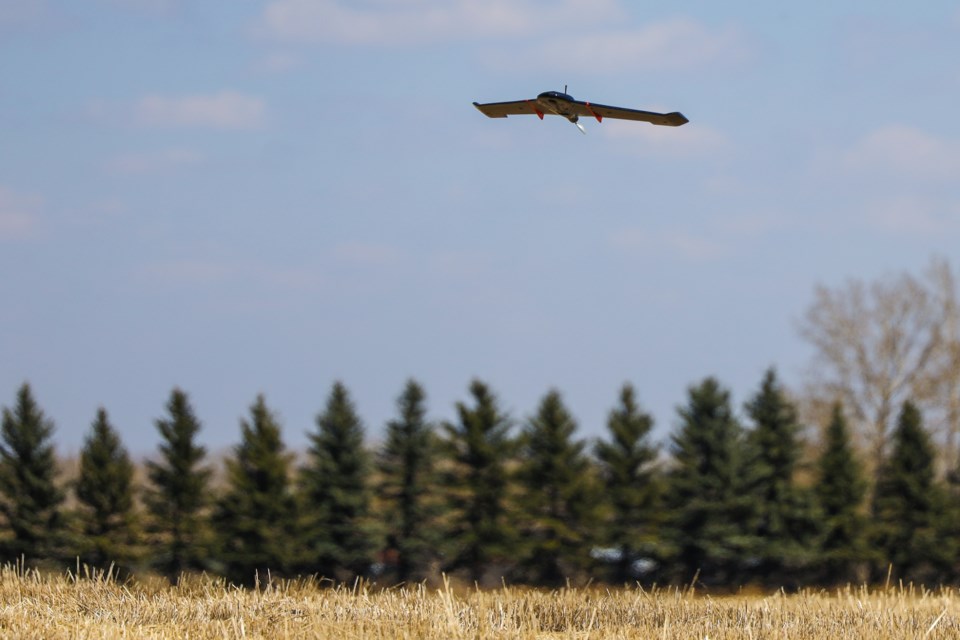OLDS – Two years after being launched, the Olds College’s Smart Farm continues to make important contributions to agricultural learning and innovation, says college president Stuart Cullum.
The college recently released the 2020 Impact Report on the Smart Farm, outlining key milestones and projects and examining programs going forward.
The Smart Farm started on 100 acres in June 2018 and has now expanded to cover the college’s full 2,000-acre farming operation.
It is a hub for examining and testing new agriculture technology, exploring processes to increase efficiency, undertaking applied research, and networking and training.
The facility sees students, teachers and others work with more than 40 industry partners and organizations.
“Not only does the Smart Farm provide a fantastic future-forward learning environment for students and producers, it also serves as a catalyst for new thinking and problems solving in agriculture,” said Cullum.
“The Smart Farm creates a place for producers, industry partners, students and faculty to look at the opportunities and challenges facing the agriculture industry and investigate solutions to evolving agriculture practices.”
In 2019 the farm covered 767 acres for crop production, 923 acres of forage production, 54 acres of dedicated research plots, a 110 head cow-calf operation, a 130 head sheep flock, and a 1,000 head capacity feedlot.
Today the Smart Farm includes expertise in numerous fields, including data science and agronomy, instrumentation, telematics and GIS/GPS, soil science, plant science and entomology, project management and agriculture business management, machine automation, and remote sensing technology.
The leadership team includes Art Froehlich, Dr. Joy Agnew, James Benkie, Jason Bradley, Dr. Alex Melnitchouch, Steve Larocque, and Ike Edeogu.
Current projects on the Smart Farm include the demonstration and field trials of autonomous agricultural equipment, including use of the DOT power platform and implements.
“By adding autonomous equipment to the Smart Farm, our student get to analyze how this leading-edge technology works,” he said. “And we use it to provide research results for producers to use and make informed decisions about how to incorporate autonomous technology into their own operations.”
Work is also being done with on-farm data collection using multi-sensor clusters to evaluate and compare performance of several types of soil, climate and crop sensors.
In the area of technology development and validation, work includes preliminary development of cattle facial recognition for cattle identification and lameness detection, evaluation of variable rate prescription mapping using satellite imagery, and the development and testing of an automated and remotely monitored in-pasture weighing system.
The Smart Farm has also been working in conjunction with other researchers across Canada, including with the Glacier FarmMedia Discovery Farm in Saskatchewan, the Ottawa L5 testing facility, and the Lakeland College student-managed farm in Vermillion.
Projects going forward include the Smart Farm becoming a hub to develop, test and demonstrate new technologies through the Canadian Agri-Food Automation and Intelligence Network.
That undertaking will see academia, research institutions and more than 60 agri-food companies focus on creating and integrating automated and digitized technology platforms within the agri-food sector, say officials.
The college now offers the Precision Agriculture – Techgronomy diploma, and the Agriculture Technology Integration post-diploma certificate – both of which involve students receiving training and instruction on the Smart Farm.
“The Smart Farm is becoming a critical asset for Alberta and our agriculture industry and a world-leading learning environment for producing the talent and workforce that is needed for our industry,” said Cullum.
“Our impact on agriculture in Alberta and Canada is significant, starting with a vision to transform our college farm from a traditional operation to a future state that includes true information-based agriculture.”
The complete 2020 Impact Report is available for view on the Olds College website.



